
Cats and Ships
Sailors and cats have a special relationship that dates back thousands of years. The US Naval Institute reports that the ancient Egyptians were likely the first seafarers to realize the value of having cats as shipmates.7 “In addition to offering sailors much-needed companionship on long voyages, cats purged ships of rodents. Without cats, a crew might find their ship overrun with rats and mice that would eat into the provisions, chew through ropes, and spread disease.”2 Hieroglyphics show Egyptian seafaring traders brought cats along on trips to the Mediterranean Sea. Their ability to control rodents on vessels is legendary, and since then, it has been essential to have a feline on a ship at all times, whether at the dock or underway.2
Myths and Legends
The majority of a ship’s cats were “polydactyl cats” because of the belief that a cat born with extra toes would have a much better sense of balance on a rocking ship, and their extra toes allowed them to climb higher and faster than typical cats.4 And not surprisingly, felines of the high seas brought a plethora of myths and legends.
1. Ship cats brought good luck, especially black cats.4
2. A cat’s keen eyesight guided ships and kept them safe from shipwrecks because a cat can more easily detect distant lights.4
3. The ship’s cat could predict the weather and start storms with its tail.7
4. If a ship’s cat sneezed, sailors watched for rain.6
5. A frisky feline had the crew bracing for strong winds.6
6. If the ship’s cat licked its fur in the direction opposite of how it grew, a hailstorm was predicted.6
この記事は Cat Talk の April 2024 版に掲載されています。
7 日間の Magzter GOLD 無料トライアルを開始して、何千もの厳選されたプレミアム ストーリー、9,000 以上の雑誌や新聞にアクセスしてください。
すでに購読者です ? サインイン
この記事は Cat Talk の April 2024 版に掲載されています。
7 日間の Magzter GOLD 無料トライアルを開始して、何千もの厳選されたプレミアム ストーリー、9,000 以上の雑誌や新聞にアクセスしてください。
すでに購読者です? サインイン

Life With Patrick
Patrick and Mount Doom
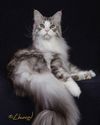
Feline Photographers Part 1
\"Cats never strike a pose that isn't photogenic.\" - Lillian Jackson Braun

The Cat Fancy Alphabet
\"The Cat Fancy Alphabet\" is a new feature in Cat Talk. It highlights various terms and aspects of the cat fancy, educating fanciers new and old about our hobby.

UP CLOSE AND Purr-sonal
If there is one person, or even just a name, that anyone in CFA (Cat Fancier Association) knows, it would have to be Allene Tartaglia. It might be from her involvement with most aspects of the operations of CFA in her position of executive director. Or perhaps from her deep involvement with both the CFA Annual meeting and/or the International Show. Cat Talk thought it was time to learn more about one of the most key people in CFA.
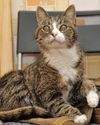
Vision and Hearing Dysfunctions in Senior Cats
Just as people are challenged by having deficiencies with vision and hearing over time, so are senior cats. In senior cats, pet owners may notice their cats are no longer responding to them in the same way; however, it may be difficult to figure out.
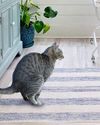
Senior Cats and House Soiling
Why is my cat no longer using its litter box? Cat soiling in the house is one of the most talked about issues for pet owners.
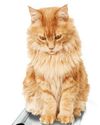
Nutrition for Our Senior Cats
From the time they are born, our kittens receive a tremendous amount of care, with diet being at the core of their growth and development.

Fluffy's Sixteen and STILL Plays Like a Kitten!
Enrichment for Senior Cats
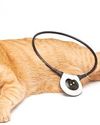
Alternative Arthritis Treatments for Cats
Just like humans, cats can experience arthritis. About 90% of cats over the age of 10 years experience osteoarthritis (OA) in at least one joint.1 It is a complex condition involving inflammation and degeneration of one or more joints and is sometimes referred to as degenerative joint disease (DJD). Cats with OA experience pain and inflammation in various joints that interfere with daily activities.

Checklist For What to Look For in Your Club's Next Show Venue
Show Manager To Ring One, Please